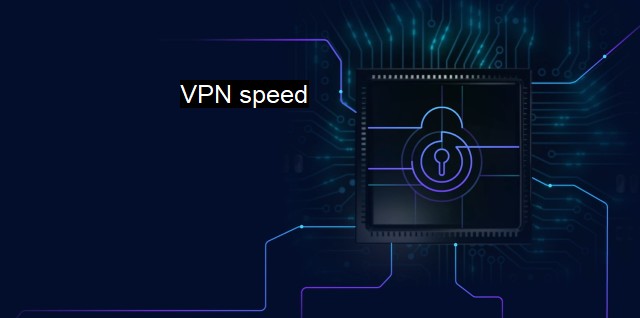What is VPN speed?
Exploring VPN Speed and its Relation to Cybersecurity: Understanding the Impact of Latency on a Fully Secured Connection
VPN speed refers to the operating speed of a Virtual Private Network, embodying the pace at which data is passed through a VPN connection. When using a VPN, several factors contribute to the rate at which information is transmitted and received. These factors affect the VPN's speed and, in turn, how efficiently users can surf the web or perform activities online.In the context of cybersecurity and antivirus tactics, a VPN serves as a secure tunnel between a user's device and the internet. It encrypts any data sent over the internet, making it inaccessible to hackers or anyone trying to intercept and read the information. As a result, the use of a VPN is essential for maintaining privacy and security in online activities, primarily when used on public Wi-Fi networks, which are often targets for cybercriminals.
One of the main concerns about using a VPN is that it can limit the internet speed. This limitation occurs because the VPN encrypts data traffic, which naturally takes time. Therefore, when secure connection protocols and data encryption are in use, the VPN speed, generally, is impacted proportionately.
Since encryption translates the readable data into unreadable text, this process alters some of the original data's features, thereby requiring more transmission space. Not only can this process slow down the speed of data transmission, but the delay can also increase proportionately to the degree at which data is encrypted.
The physical distance from the VPN server plays a significant role in the VPN speed. If the VPN server is far away from the user's location, it will take more time for the data to travel back and forth, thereby affecting the VPN speed. Usually, connecting to a localized server with less traffic ensures faster speeds, while using servers located overseas or ones inundated with users can cause marked slow-downs.
The hardware used, both for your VPN and your personal device (whether computer, smartphone, etc.), also impacts VPN speed. If either is outdated or underpowered, it may struggle to handle demanding encryption algorithms quickly leading to a slower VPN speed.
Bandwidth throttling, practiced by some internet service providers (ISPs), is another factor that can slow down a VPN. Some ISPs intentionally slow down, or “throttle,” your bandwidth to reduce congestion and regulate network traffic. Using a good quality VPN can effectively mask your internet traffic from your ISP, thus helping avoid unjust throttling and maintaining a better internet speed.
On a brighter note, some sophisticated VPN service providers utilize their technology to potentially increase internet speed. They use advanced algorithms to compress the data during transmission, thus maximizing the effective bandwidth.
One point to be noted is that VPN might not be equally efficient for every application. For instance, VPNs are generally known to be less effective for high-speed gaming because a millisecond delay could decide the outcome of a gaming situation.
VPN speed is a crucial attribute when considering cybersecurity and antivirus strategies. While a VPN contributes significantly to enhanced online security, it does have trade-off implications for internet speed due to encryption, distance, and potential bandwidth throttling which could have an impact upon user experience and functionality. premium VPN solutions manage this trade-off with operating optimizations and by offering the choice of servers for expected optimal VPN speed. Understanding VPN speed's importance and influencing factors will help in securing an accomplished online safety experience.

VPN speed FAQs
What is VPN speed and why is it important for cybersecurity?
VPN speed is the rate at which a Virtual Private Network (VPN) service transmits data. It's essential for cybersecurity because a VPN can slow down your internet connection, causing slow loading pages and streaming videos. This slowdown can make you vulnerable to cyber threats because it can limit the speed at which your antivirus software responds.How can I improve my VPN speed without compromising my cybersecurity?
To improve VPN speed without compromising cybersecurity, consider a VPN service with a broad network server coverage. Look for a provider that offers optimized servers, speed-boosting features, and safe protocols. Also, consider upgrading your internet plan, checking your router setup, and minimizing background processes and programs.Why is antivirus software important when using a VPN?
Antivirus software is essential when using a VPN because even with a VPN, cybercriminals can still exploit vulnerabilities in your system to steal your data or infect your device with malware. VPNs only encrypt your data in transit, and antiviruses guard against malware that penetrates your system.Can my antivirus software slow down my VPN connection?
Yes, antivirus software can slow down your VPN connection because it scans data before allowing it to transmit through the VPN server. To avoid this, use an antivirus software that's optimized for VPN connections, select a VPN service that offers a kill switch feature, or exclude your VPN service from your antivirus scans.| | A | | | B | | | C | | | D | | | E | | | F | | | G | | | H | | | I | | | J | | | K | | | L | | | M | |
| | N | | | O | | | P | | | Q | | | R | | | S | | | T | | | U | | | V | | | W | | | X | | | Y | | | Z | |
| | 1 | | | 2 | | | 3 | | | 4 | | | 7 | | | 8 | | |||||||